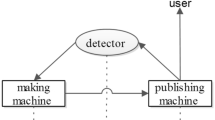Abstract
As many industrial systems become more complex, it becomes extremely difficult to diagnose the cause of failures. This paper presents a new failure diagnosis approach based on discrete-event systems (DES) framework. In particular, the approach is a hybrid of event-based and state-based ones leading to a simpler failure diagnoser with supervisory control capability. In our approach, we include the failure recovery events for failures in the system model in order to derive a diagnoser we refer to as a recoverable diagnoser. Further, in order to reduce the state size of the recoverable diagnoser, a procedure to construct a high-level diagnoser is presented. The design procedure for diagnoser is presented along with a pump-valve system as a illustrative example.
Similar content being viewed by others
References
Brandt R.D., Garg V., Kumar R., Lin F., Marcus S.I., Wonham W.M. (1990). Formulas for calculating supremal controllable and normal sublanguages. System Control Letter 15(2): 111–117
Cassandras, C. G. (1993). Discrete event systems: Modeling and performance analysis. Richard D. Irwin, Inc.
Davey, B. A., & Priestley, H. A. (1990). Introduction to lattices and order. Cambridge University Press.
Hashtrudi Zad, S. (1999). Fault diagnosis in discrete-event and hybrid systems. Ph.D. Thesis, The University of Toronto.
Hashtrudi Zad S., Kwong R.H., Wonham W.M. (2003). Fault diagnosis in discrete-event systems: Framework and model reduction. IEEE Transaction on Automatic Control 48(7): 1199–1212
Hopcroft, J. E., & Ullman, J. D. (1979). Introduction to automata theory, languages and computation. Addision-Wesley.
Kumar, R., & Garg, V. (1995). Modeling and control of logical discrete event systems. Kluwer Academic Publishers.
Lin, F., & Lin, T. W. (1993). Diagnosability of discrete event systems and its applications to circuit testing. Proceedings of the 36th Midwest symposium on circuits and systems.
Park, Y. (1996). Model-based monitoring of discrete event systems. Ph.D. Thesis, The Purdue University.
Ramadge P.J., Wonham W.M. (1989). The control of discrete event systems. Proceeding of IEEE 77: 81–98
Sampath, M. (1995). A discrete event systems approach to failure diagnosis. Ph.D. Thesis, The University of Michigan.
Sampath M., Lafortune S., Teneketzis D. (1998). Active diagnosis of discrete-event systems. IEEE Transaction on Automatic Control 43(7): 908–929
Sampath M., Sengupta R., Lafortune S., Sinnamohideen K., Teneketzis D. (1995). Diagnosability of discrete-event systems. IEEE Transaction on Automatic Control 40(9): 1555–1575
Wonham, W. M. (1998). Notes on control of discrete event systems. Department of Electrical and Computer Engineering, University of Toronto.
Wonham W.M., Ramadge P.J. (1987). On the supremal controllable sublanguage of a given language. SIAM Journal of Control and Optimization 25(3): 637–659
Author information
Authors and Affiliations
Corresponding author
Rights and permissions
About this article
Cite this article
Son, H.I., Lee, S. Failure diagnosis and recovery based on DES framework. J Intell Manuf 18, 249–260 (2007). https://doi.org/10.1007/s10845-007-0018-8
Received:
Revised:
Published:
Issue Date:
DOI: https://doi.org/10.1007/s10845-007-0018-8




